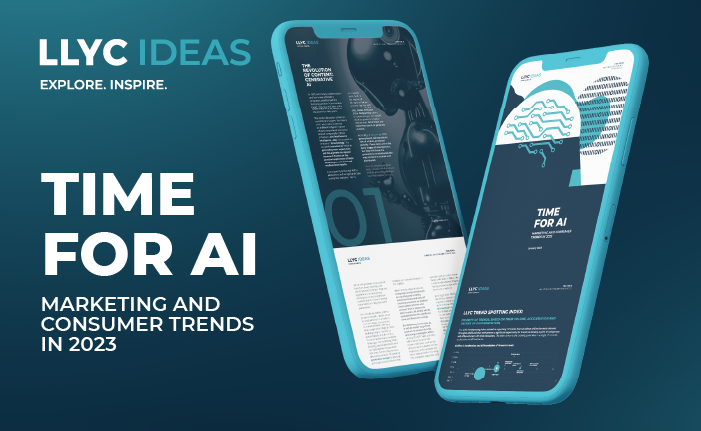-
TrendsPublications and Reports
Companies are facing another year of uncertainty. Their activities will be conditioned by exogenous factors (changes in consumer habits) and endogenous factors (the impact of technological transformation on work processes). With the explosion of artificial intelligence, in which generative models have burst onto the scene, the relationship between brands and consumers is becoming increasingly important. In this context, where should professional marketing and consumer products and services focus? How can they anticipate the challenges and changes ahead? How can the emergence of generative AI models such as ChatGPT, for example, affect them?
LLYC’s Consumer Engagement and Deep Digital Business teams present the 10 trends that, driven by the explosion of Artificial Intelligence, will influence consumers and businesses in 2023. Proprietary Trend Spotting trend anticipation methodology was used to compile this report. From there, a multidisciplinary team of senior LLYC experts selected the most relevant ones based on criteria of impact, novelty and differentiation.
On the one hand, there are trends that reflect technological advances: measurement and data with trends such as generative AI, CX orchestration (zero party data, personalization and application to journeys), attribution models or data analysis in all instances of the strategy. In addition, we can see new trends associated with changes in consumer habits, related to spending control or the consumption of monetized content. Simultaneously, buzzwords such as the metaverse, super apps, behavioral economics and decentralized commerce are appearing.
David Gonzalez Natal, Partner and Global Engagement Manager at LLYC: “When macroeconomic prospects prove challenging, companies tend to reduce their investments in marketing and communication. However, everything seems to be pointing in the opposite direction. Consumer technologies are currently booming. Against this background, it seems to us key to analyze how the crossovers between the exponential development of technologies and their popularization determine what to pay attention to in order to optimize investment and continue to add value to both companies and consumers.”
“In this context, companies need to be pragmatic in addressing their business challenges, and that pragmatism necessarily involves solutions that allow them to measure the impact of their decisions in both the short and long term, ensuring that their interests are aligned with those of their customers, and that they are getting a precise return on investment,” asserts Ibo Sanz, Global Senior Director of Deep Digital Business Strategy at LLYC.
Here are the 10 trends identified in the LLYC report that will shape Marketing and Consumption in 2023:
Revolutionary content: Generative AI. Harnessing Artificial Intelligence enables companies and professionals to automate tasks and enter into creative processes, generating developments and original customized content for their brands, in a fast, credible way and with considerable savings in time and money.
Behavioral economics: intention vs. behavior? This discipline improves the effectiveness of business activities and helps to understand the decisions we make in our day-to-day activities. Understanding and acting on these patterns is critical to bridging the gap between intention and behavior. Companies that use these practices achieve higher conversion in the sales funnel, improving and expanding their transaction history.
The fight for content monetization. Content creators are increasingly jealous of their autonomy from social networks. Any changes to their algorithms will potentially penalize the organic reach of the content and, therefore, their revenue. This explains why more and more companies are opting for direct subscription models, without intermediaries, taking into account the real reach that can be obtained. Segmenting the market makes it impossible to capture mass audiences, so both creators and platforms need each other. A balance that has yet to be clarified.
Does every penny count? Attribution in purchasing decisions. Knowledge is essential when choosing the right attribution models for each campaign or business: customer touch points, channels, devices used, campaign objective and buyer persona. To master this, data and AI are key.
CX from zero party data and personalization. Customer experience (CX) will continue to be the number one priority for companies in 2023. Brands will face more connected, more digitized, more informed and much more demanding consumers, so it is necessary to be clear about where and how to focus efforts. Customization will be the most powerful asset to enhance the CX. Consumers demand more privacy but, when they are connected to a brand, they are willing to proactively share their data.
High prices, low costs. The outlook for consumer dynamics is increasingly conservative, paving the way for the return of promotion hunters to smooth household finances. Brands are therefore expected to strive to differentiate their product/service, as well as to be increasingly price competitive in the face of a more cautious consumer who is more attentive to household spending.
Goodbye Big Data, Hello Huge Data. Data growth is exponential. They are and will remain the central assets of organizations and the core of digital transformation. However, they are only as good as the questions you ask them. If we do this from a consistent business perspective and with reliable sources of information, we will have a great competitive advantage in the industry.
Super apps and super expectations. In this 2023, the application experience would have to be further analyzed, creating a holistic customer-centric one that consolidates functions and forces users to integrate it into their daily lives. Thinking from the customer’s point of view will make solutions more practical and inclusive.
The still-to-come metaverse. While there are still difficulties involved in building it on a long path to implementation, the metaverse remains at the top of the agenda for many CMOs, CIOs and CTOs. It is the time to experiment and find new ways to use virtual 3D environments as the metaverse continues to unfold over the years.
D-commerce: Decentralized, Direct and Democratic. Six major corporations now control 60% of the world’s e-commerce. Developments in Web 3.0 and blockchain technology will bring about a fully decentralized network in which the need for an intermediary for any transaction will be eliminated. This should empower companies to sell their products to users directly and in a personalized way, making e-commerce more transparent, horizontal and democratic based on P2P relationships with improved security.



